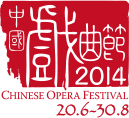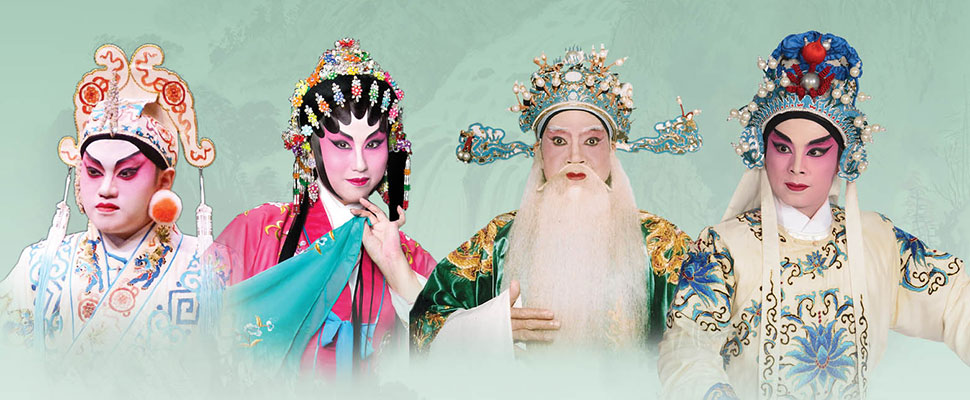With the fall of the Qin Dynasty, many rebel forces rise to contend for the rule of the Central Plains. They include Liu Bang and Xiang Yu. Han Xin is a soldier serving Xiang Yu of Chu, but knowing that he is a man of ire and therefore not a good leader, and on the recommendation of Zhang Liang, he decides to defect to the Han camp. He travels with his mother, but she dies on the way. Xin is also chased by the Chu soldiers. In desperation, he meets a woodcutter, and begs him to show the way to Han land. But on parting, Xin fears that the woodcutter would give away his route of escape, he cannot but kill him. He finally arrives at Han land, but is all worn out and struck by hunger and thirst. He meets a washer woman who sees that he is cut out for an enterprising career. She gives him food, cash and a good horse. Xin is totally touched, and rides away.

- Peking Opera Research Centre of Hebei
- Four Stylistic Schools of Xiaosheng Roles in Yue Opera
- A New Cantonese Opera Investigation to Redress a Wrong
- Reverberating Notes from South China Highlights of the Eight Classic Pieces
- Zhejiang Yongjia Kunqu Opera Troupe
- Yunnan Dian Opera Theatre
- Experimental Theatre of Liyuan Opera of Fujian
- Haifeng Baizi Opera Troupe of Guangdong
- No.2 Troupe of Yu Opera Theatre of Henan
- Jingkun Theatre
Reverberating Notes from South China
Highlights of the Eight Classic Pieces
8–9 July 2014 Cast Change
Main casts of Han Xin Accepting Food from the Washer Woman of Excerpts from Han Xin Defects to Han from Chu, Mr Ho Ka-yiu and Ms Cheng Man-yee will not be able to take part in the performance and their roles will be replaced by Mr Tam Wing-lun and Ms Wong Po-huan.
There are eight famous pieces in the sung music of South China (or ‘Lingnan’), with the scores originating from Cantonese Opera, known as “Eight Classic Pieces”. Each follows a stringent way of voice delivery as well as rules for ensemble accompaniment. Thanks to the salvaging efforts of the Cantonese song art expert, Mr Leung Yee-chung (1905-1974), who collated the vocal tracks of the eight pieces on Commercial Radio in 1966, this invaluable repertory of song art was preserved. In a bid to save it from extinction, the Faculty of Education of the University of Hong Kong launched a research and develo pment project to tie in with this meaningful project, this year’s Festival will present the exquisite of the Eight Classic Pieces. Under the artistic direction of Leung So-kam, daughter of the late Mr Leung Yee-chung and herself a famous singer of Cantonese arias, stars of Cantonese Opera in Hong Kong including Law Kar-ying, Yuen Siu-fai, Liu Kwok-sum and Cheng Wing-mui will perform the full-length production Lulang Reprimands His Son from among the Eight Classic Pieces. The vocal style will be modelled upon the recordings made by Mr Leung on Commercial Radio in 1966. There will also be two shows in which Cantonese operatic song artists Leung Chi-kit, Ting Oi-lin; Cantonese Opera star, Sun Kim-long with Tam Wing-lun, Wong Po-huan, Wong Hok-chiu and Yuen Tak-man, to present arias and excerpts from the Eight Classic Pieces. The Hong Kong audience will be able to revisit this invaluable musical heritage of South China, which had once almost fallen into oblivion.
| artistic director | Leung So-kam |
| producer | Li Kei-fung |
| Excerpts from Daiyu Buries Fallen Flowers: | ||
Jia Baoyu’s Lament for the Wrong Match in the Arranged Marriage |
vocal | Leung Chi-kit |
Death of Lin Daiyu |
vocal | Ting Oi-lin |
Jia Baoyu Mourning Daiyu |
vocal | Sun Kim-long |
Excerpts from Han Xin Defects to Han from Chu:
Han Xin Accepting Food from the Washer Woman
| cast | Tam Wing-lun, Wong Po-huan |
Xiao He Chases After Han Xin
The story takes place in the early founding years of the Han regime. Emperor Liu Bang appoints Xiao He as his prime minister, and the latter invites talents from all over the country to serve the new Han emperor. Han Xin attends the interview, but did not show the recommendation by Zhang Liang. Liu finds Xin too ordinary-looking to make a good general, so he only gives Xin the position as an army provision officer. Xin feels slighted, and wants to go home to become a farmer. Xiao hears of this, and chases after Xin under the moon with Xiahou Ying. On catching up with Xin, Xiao persuades Xin to go back to Liu’s camp, and finally succeeds in convincing him.
| cast | Yuen Tak-man, Wong Hok-chiu, Ng Lap-hei |
Excerpts from Baili Xi Reunited with His Wife |
vocal | Yuen Siu-fai |
Excerpts from Monk Biancai Releases the Demon: |
||
Reading in the Study at Night |
vocal | Leung Chi-kit |
Lulang Reprimands His Son (Full-length opera)
Yang Lulang, the sixth son of the patriotic Yang family, leads an army to fight the invading Liao. He sends his son, Yang Zongbao, to keep surveillance of the camp ground. Zongbao happens to pass by the Muke Fortress, and meets the daughter of Lord Muke, Mu Guiying. It is love at first sight, and the two are married without getting the approval of the elders first. So when Zongbao returns to camp and faces his father, the latter is furious, so much so that he orders Zongbao executed on grounds of breaching the martial law. Even when Lulang’s mother, Dowager She, and the Eighth Prince speak on Zongbao’s behalf, Lulang is adamant. In order to save her husband, Guiying visits the Song camp, bringing with her army provisions as a gesture of appeasement, and presenting to Lulang the magical ‘Dragon Vanquishing Wood’ to pledge her allegiance. She goes so far as to argue with Lulang over Zongbao’s case. Finally Lulang is brought round, and the lovers are reunited.
| cast | Law Kar-ying, Yuen Siu-fai, Liu Kwok-sum, Cheng Wing-mui, Leung Wai-hong, Lai Yiu-wai, Song Hongbo, Li Pui-yan |
Artistic Director
Leung So-kam
Leung So-kam was born into a family of Chinese song art performers. Her father, Leung Yee-chung, was a leading light in the genre of Cantonese music and song art, while her mother Cheung Yuk-king (stage name ‘King Sin’) was a Cantonese song art performer singing the zi hou (falsetto voice). Leung began broadcasting when she was only six, singing the classic piece Remonishing Her Husband. She began her career in Cantonese Opera later, and was a disciple of the famous Chan Kam-tong and the legendary Sit Kok-sin. She appeared in the full-scale productions of well-established troupes such as Kam Tim Fa and Kok Sin Sing. She was also active in the recording studio, singing with such famous stars as Leng Chi Pak, Ngan Kim Ying, Leung Mo-seung, Ho Fei-fan, Yam Kim-fai, Yee Chau-shui, Chan Kam-tong, Wong Chin-shui, Man Chin-shui, Sun Ma Sze Tsang, Chung Wan-shan and Chui Mo-pak, not to mention her own father Leung Yee-chung. She appeared on her father’s show on Commercial Radio, The Eight Classic Pieces in Cantonese Opera, during the 1960’s, in which she sang such roles as Mu Gua and the Washer Woman. She is also known for her singing style which is tuneful and demonstrates the scholastic touch.
Cast on the shows of July 8 and 9 (In order of appearance)
Leung Chi-kit
Leung Chi-kit is the youngest daughter of Maestro Leung Yee-chung, and younger sister of Leung So-kam, a famous name in Cantonese Opera and Cantonese song art. She was exposed to the singing of Cantonese operatic arias since she was young, and made her stage debut at five singing Liang Shanbo on His Death Bed. Coached by her sister, she has grasped the consummate vocal techniques of So-kam, and her ping hou (natural voice) renditions are also imbued with the flavour of her father’s stylistic school, Jiexinqiang. She made the recording of Cantonese operatic arias, Revisiting the Glorious Dream, The Peacock Flies Southeast and The Story of the Wooden Hairpin as partner to her sister. She enrolled in the extension course for Chinese Opera Performance of The Hong Kong Academy for Performing Arts in 2010, where she trained in xiaosheng (young civil male) role. On completion of the course, she has appeared in public performances of operatic excerpts, such as The Phoenix and Comparing the Embroidered Shoes from The Case of the Red Gauze Clue for the Headless Corpse.
Ting Oi-lin
Ting Oi-lin specializes in singing the zi hou (falsetto voice) for female actors of Cantonese Opera. She was exposed to the voices of Ms Leung So-kam and Leung’s mother, Cheung Yuk-king, since she was young, and developed a passion for Cantonese music and the ‘old style’ singing of Cantonese operatic arias. Her artistic lineage is therefore closely linked to the Leung family, resulting in her formal acceptance as a disciple of the Leung school in 2005.
Sun Kim-long
Sun Kim-long began his apprenticeship under the Cantonese Opera master Wu Gongxia during the 60s of last century. He also studied martial arts from Xu Junhan. Besides having extensive stage experience, he also actively involves in Cantonese Opera promotion and productions. He wrote Reflection of Beauties in Lotus Pond, The Green Jade Hairpin, Shandong Highwayman, etc. He won the Commendation Award from the Home Affairs Bureau of the Hong Kong SAR Government in 2009 and Chief Executive’s Commendation for Community Service from the Hong Kong SAR Government in 2012. He is currently vice-chairman of The Chinese Artists Association of Hong Kong.
Tam Wing-lun
Tam Wing-lun started his knowledge on Cantonese Opera when he was two and joined the Hong Kong Children and Juvenile Chinese Opera Troupe a year later. Cheung Po-wah, Lui Hung-kwong, Cheng Wing-mui, Ng Cheuk-chung, Fu Yuehua and Wong Ka-ling are his trainers on basic stylized movements, and he learns singing from Lam Kam-tong. He won the Award for Young Artist (Xiqu) of the Hong Kong Arts Development Awards 2013.
Wong Po-huan
Wong Po-huan received Cantonese Opera training under Ng Lut-kwong. Her father, Wong Kam-tong, is a famous Cantonese Opera performer. She obtained Advanced Certificate in Performance Arts (Cantonese Opera) from The Hong Kong Academy for Performing Arts in 2005. She is active in participating Cantonese Opera performances organized by various troupes. She formed Cantonese Opera Theatre in 2007 and by presenting various performances to enrich her stage experience. Wong is keen on learning various aspects of Cantonese Opera, such as musical instruments, writing scripts and music. She also writes articles for Cantonese Opera magazine. In 2014, she received the Outstanding Performance Award in the Xiqu Centre of the West Kowloon Cultural District – Rising Stars in Cantonese Opera Showcase.
Yuen Tak-man
Yuen Tak-man trained at the Zhanjiang Arts School and Cantonese Opera School in Guangdong. He enrolled in the Chinese Opera programme of The Hong Kong Academy for Performing Arts in 2008, and on completion in 2012, he joined the Young Academy Cantonese Opera Troupe where he specializes in xiaosheng (young civil male) and wusheng (military male) roles. His repertoire includes The Legend of the White Snake, Xue Pinggui Leaving His Humble Abode, Lu’anzhou, Daiyu at Her Death Bed from The Dream of the Red Chamber, Mothers and Sons, The Chalk Circle, A Long Road and a Fond Parting (Excerpt from The Butterfly Lovers) and The Gold Hairpin as Matchmaker.
Wong Hok-chiu
Wong Hok-chiu joined the Naning City Yong Opera Troupe in Guangxi in 1957, where he became a disciple of Wen Wuying and Li Mingyang. Later he received further training at the Wuhan City Peking Opera Troupe, where he was coached by famous virtuosi of the genre, Gao Shenglin and Guo Yukun. He was the Company Director of the Naning City Cantonese Opera Troupe until he retired. He was named a ‘Top Actor’ by the Ministry of Culture in 1983, and accredited as a National Class One Performer in 1984. Throughout his career of over forty years, Wong has starred in many Yong Operas and plays with modern themes and settings. After resettling in Hong Kong, he has performed secondary and supporting roles with many local Cantonese Opera troupes, including Tung Sing, Fung Sang Fai, New Kwan Ying and Ming Chee Sing.
Ng Lap-hei
Ng Lap-hei began his training in Cantonese operatic songs under Wong Yee-man at an early age. He received further training under Yang Ming and Ho Ka-yiu for Peking Opera and Kunqu stylized movements and traditional Cantonese formulaic plays. He graduated from Cantonese Opera training course organized by The Cantonese Opera Academy of Hong Kong and has appeared in performances of operatic excerpts, such as The Long Slope Hill, Eight Mallets, Luhuadang.
Production Team
| music director | Ng Lut-kwong |
| percussion director | Sung Heung-man |
| accompaniment | Music Ensemble of School of Chinese Opera, the Hong Kong Academy for Performing Arts |
| stage manager | Leung Wai-hong |
| lighting and set | Kwong Hing Stage Scene Production Company |
Cast on the shows of July 30 and 31 (In order of appearance)
Yuen Siu-fai
Yuen Siu-fai began his training under the tutelage of the renowned performer New Ting Heung-yiu. He later became a student of the famous Cantonese Opera actor Mak Bing-wing. A recipient of the Annual Hong Kong Artist Award and other honours, he had been to London to give a Royal Command Performance for Queen Elizabeth II. He has devoted himself to the promotion of the art of traditional operas and was the producer of The Orphan of Zhao and Fifteen Strings of Cash. He also wrote The Long Slope Hill, The Four Imperial Students, Tracking in the Snow and The Return of Cai Wenji. He was granted an honorary fellowship by the Hong Kong Institute of Education in 2012. He is currently vice-chairman of the Chinese Artists Association of Hong Kong.
Leung Chi-kit
Leung Chi-kit is the youngest daughter of Maestro Leung Yee-chung, and younger sister of Leung So-kam, a famous name in Cantonese Opera and Cantonese song art. She was exposed to the singing of Cantonese operatic arias since she was young, and made her stage debut at five singing Liang Shanbo on His Death Bed. Coached by her sister, she has grasped the consummate vocal techniques of So-kam, and her ping hou (natural voice) renditions are also imbued with the flavour of her father’s stylistic school, Jiexinqiang. She made the recording of Cantonese operatic arias, Revisiting the Glorious Dream, The Peacock Flies Southeast and The Story of the Wooden Hairpin as partner to her sister. She enrolled in the extension course for Chinese Opera Performance of The Hong Kong Academy for Performing Arts in 2010, where she trained in xiaosheng (young civil male) role. On completion of the course, she has appeared in public performances of operatic excerpts, such as The Phoenix and Comparing the Embroidered Shoes from The Case of the Red Gauze Clue for the Headless Corpse.
Law Kar-ying
Law Kar-ying began receiving formal training in basic stylized movements and routines at age eight under his father Law Kar-kuen, and in singing and acting with his uncles Law Kar-shu and Law Kar-wui. During the course of his operatic training he also came under the coaching of Fen Kuk-fa, Lui Kwok-chuen, Liu Xun and Leung So-kam. He staged a dozen of new productions such as The Story of Liu Yaojin, Dragon’s Prescript, Di Qing, The Immortal Zhang Yuqiao and Cao Cao and Yang Xiu. Law also adapted Shakespeare’s Macbeth and King Lear into Cantonese Opera and also Deling and Empress Dowager Ci Xi in 2010 and set a new trend in the genre. Law received a Medal of Honour from the Hong Kong SAR Government in 2012, the World Outstanding Chinese Award and an honorary doctorate from the Ohio Northern University, USA in 2013.
Liu Kwok-sum
Liu Kwok-sum was among the first batch of students of the Cantonese Opera Academy of Hong Kong. He learned beipai (the Northern skill) from Yam Dai-fun and singing from Wong Yue-sheng. He later joined the Chor Fung Ming Cantonese Opera Troupe and performed in Farewell, My Husband, The Tragedy of the Poet King, The Sword of Bravery and The Butterfly and Red Pear Blossoms. He also participated in the overseas performances of Chor Fung Ming in the United States, Canada and Australia. He performs the role of wusheng (military male) for major opera troupes in recent years.
Cheng Wing-mui
Cheng Wing-mui received huadan (female lead) training under the two famous Cantonese Opera stars, Law Kar-ying and Lee Po-ying, and the ensemble leader, Keung Chi-leung, which included dramatic postures and percussive points on the Cantonese Opera stage. She received further training in Cantonese operatic singing under Lau Kin-wing, and martial arts and stylized movements under several Peking Opera veterans. She is therefore an all-round actor in the field. She formed the Kam Yuk Tong Cantonese Opera Troupe in 1988, which gives regular performances at various performing venues in Hong Kong, as well as in Macao, Singapore and Malaysia. The Troupe appeared in the China Festival held in Berlin in 2001.
Leung Wai-hong
The son of Leung Hon-wai, Leung Wai-hong is very knowledgeable about Chinese Opera. He is a student of Yuen Siu-fai, who teaches him the finest of the traditional performing art. Besides acting, Leung is also experienced in other areas including directing, stage managing, lighting, music and set design. He specializes in the role of chou (comic) in recent years and is proficient in different variants of the category.
Lai Yiu-wai
Lai Yiu-wai began learning the art at the age of nine. He studied under Man Lai-fung, Poon Sai-lun, Hon Yin-ming, and finally became a disciple of Man Chin-sui. He performs regularly for major opera troupes and is good at different roles including hualian (painted-face), xusheng (old male) and xiaosheng (young civil male). He received the Outstanding Young Cantonese Traditional Opera Artiste Award for sheng (male role) actors in 2010 and the Award for Young Artist (Xiqu) of the Hong Kong Arts Development Awards by the Hong Kong Arts Development Council in 2011.
Song Hongbo
Song Hongbo holds an Advanced Diploma in Performing Arts (Cantonese Opera) from the Hong Kong Academy for Performing Arts, where his teachers included Liu Xun, Hui Kin-shun, Cheung Sai-kit et al. He has appeared in A Meeting of Heroes, Lu Bu and Diao Chan, At the Sweet Dew Monastery, etc. He has also appeared in such major productions as The Cosmic Mirror and Stealing the Imperial Horse. He was a member of the touring troupe of the Academy.
Li Pui-yan
Born into a family of Cantonese Opera heritage (daughter of Li Kei-fung and Yu Wai-fun), Li Pui-yan graduated from Wellesley College, USA, and is dedicated to the preservation and promotion of the art of Cantonese Opera. She had studied singing from Chung Lai-yung, Xue Ya-ping and Li Mei-fa and her dance and body movements were trained by Yang Min and Yu Mei-di. She had also received additional training from her godparents, Law Kar-ying and Liza Wang. She debuted as principal actress in Floral Princess (Youth Edition) production in 2007. Other trained repertoires include Rejuvenation of Lady Plum Blossom, Tale of the Purple Hairpin, Sisterly Love amidst Turmoil, The Villain, The General and the Heroic Beauty and Deling and Empress Dowager Ci Xi, etc. Li is also devoted to the English translation of Cantonese opera librettos.
Production Team
| percussion ensemble leader | Ko Yun-kuen |
| ensemble leader | Ko Yun-hung |
| stage manager | Leung Wai-hong |
| lighting and set | Kwong Hing Stage Scene Production Company |
| props and costume | Kam Yee Costumes Company |
Eight Classic Pieces of South China
There are eight famous pieces in the sung music of South China (or “Lingnan”), with the scores originating from Cantonese Opera, known as “Eight Classic Pieces”. Each has a specialized way of vocal delivery. The accompanying ensemble is a ‘five-piece combo’, viz. erxian, tiqin, yueqin, sanxian and percussion. The accompanying music consists of preludes and interludes, played according to stringent rules. The vocal styles and preludes in Cantonese sung music today follow those set in the Eight Classic Pieces, a fact that points to their historical significance and long-lasting influence on the development of the genre.
Thanks to the salvaging efforts of the Cantonese song art expert, Mr Leung Yee-chung (1905-1974), who collated the vocal tracks of the eight pieces on Commercial Radio in 1966, this invaluable repertory of song art was preserved. Recently the Faculty of Education of The University of Hong Kong has launched a research and development project to save it from extinction. To tie in with the meaningful work and under the artistic direction of Leung So-kam, daughter of the late Mr Leung Yee-chung and herself a famous singer of Cantonese arias, this programme will present a revival of the full-length version of Lulang Reprimands His Son, one of the Eight Classic Pieces, and excerpts from the other pieces so as to allow the audience the opportunity to revisit this operatic legacy.
Leung Yee-chung (1905-1974)
Leung Yee-chung was a leading light in Cantonese song art. A versatile musician who could play the erxian, erhu, violin, suona, sanxian and percussion, he was also a consummate vocalist who could blend the Cantonese vernacular singing style with the traditional musical styles of bangzi and erhuang, thus inventing his unique Jiexinqiang vocal school. In fact, the many current singing styles in Cantonese operatic music, whether in the falsetto or natural voice, show the influence of Maestro Leung. As a composer and librettist, Leung also wrote several highly popular tunes in Cantonese music and song art. He had devoted his entire life to promoting this song art form and preserving its legacy, and one of the remarkable feats was his salvaging efforts that he made on Commercial Radio in 1966 by collating the vocal tracks of the Eight Classic Pieces in South China, therefore preserving this invaluable repertory of song art.
STAGE

Ticket Price
![]() $220
$220
![]() $160
$160
STAGE

Ticket Price
![]() $360
$360
![]() $280
$280
![]() $200
$200
![]() $120
$120
- Lyrics with Chinese surtitles and English scene synopses
- Please refer to the ‘Extension Activities’ page for details of extension activities
- Each performance lasts approx. 2 hours and 30 minutes with a 15-minute intermission
| Programme Enquiries | 2268 7325 |
| Ticketing Enquiries | 3761 6661 |
| Telephone Credit Card Booking | 2111 5999 |
| Internet Booking | www.urbtix.hk |
Please click here for discount scheme details.















